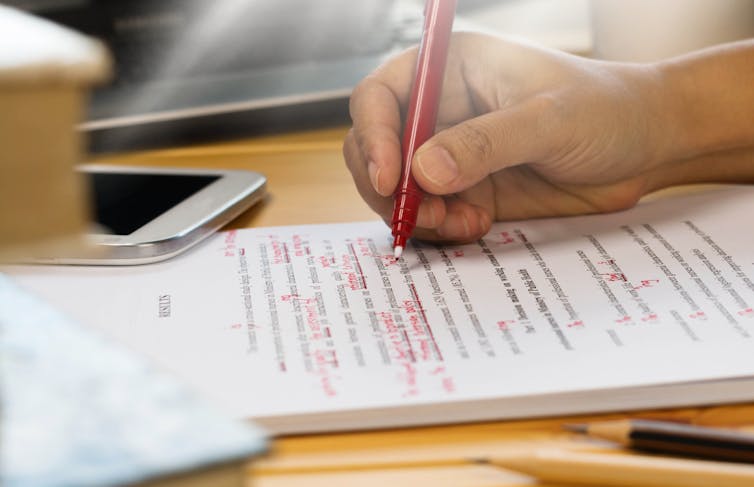When does getting help on an assignment turn into cheating?
- Written by Peter Hurley, Policy Fellow, Mitchell Institute, Victoria University
Students – whether at university or school – can get help from many places. They can go to a tutor, parent, teacher, a friend or consult a textbook.
But at which point does getting help cross the line into cheating?
Sometimes it’s clear. If you use a spy camera or smartwatch in an exam, you’re clearly cheating. And you’re cheating if you get a friend to sit an exam for you or write your assignment.
At other times the line is blurry. When it’s crossed, it constitutes academic misconduct. Academic misconduct is any action or attempted action that may result in creating an unfair academic advantage for yourself or others.
What about getting someone else to read a draft of your essay? What if they do more than proofread and they alter sections of an assignment? Does that constitute academic misconduct?
Learning, teaching or cheating?
There are a wide range of activities that constitute academic misconduct. These can include:
fabrication, which is just making things up. I could say “90 % of people admit to fabricating their assignments”, when this is not a fact but a statement I just invented
falsification, which is manipulating data to inaccurately portray results. This can occur by taking research results out of context and drawing conclusions not supported by data
misrepresentation, which is falsely representing yourself. Did you know I have a master’s degree from the University of Oxford on this topic? (Actually, I don’t)
plagiarism, which is when you use other people’s ideas or words without appropriate attribution. For instance, this list came from other people’s research and it is important to reference the source.
Sometimes students and teachers have different ideas of academic misconduct. One study found around 45% of academics thought getting someone else to correct a draft could constitute academic misconduct. But only 32% of students thought the same thing.
Read more: Assessment design won’t stop cheating, but our relationships with students might
In the same survey, most academics and students agreed having someone else like a parent or friend identify errors in a draft assignment, as opposed to correcting them, was fine.
 Students and academics agree having someone else identify errors in your assignment is OK. Correcting them is another story.
from shutterstock.com
Students and academics agree having someone else identify errors in your assignment is OK. Correcting them is another story.
from shutterstock.com
Generally when a lecturer, teacher or another marker is assessing an assignment they need to establish the authenticity of the work. Authenticity means having confidence the work actually relates to the performance of the person being assessed, and not of another person.
The Australian government’s vocational education and training sector’s quality watchdog, for instance, considers authenticity as one of four so-called rules of evidence for an “effective assessment”.
The rules are:
validity, which is when the assessor is confident the student has the skills and knowledge required by the module or unit
sufficiency, which is when the quality, quantity and relevance of the assessment evidence is enough for the assessor to make a judgement
authenticity, where the assessor is confident the evidence presented for assessment is the learner’s own work
currency, where the assessor is confident the evidence relates to what the student can do now instead of some time in the past.
Generally speaking, if the assessor is confident the work is the product of a student’s thoughts and where help has been provided there is proper acknowledgement, it should be fine.
Why is cheating a problem?
It’s difficult to get a handle on how big the cheating problem is. Nearly 30% of students who responded to a 2012 UK survey agreed they had “submitted work taken wholly from an internet source” as their own.
In Australia, 6% of students in a survey of 14,000 reported they had engaged in “outsourcing behaviours” such as submitting someone else’s assignment as their own, and 15% of students had bought, sold or traded notes.
Getting someone to help with your assignment might seem harmless but it can hinder the learning process. The teacher needs to understand where the student is at with their learning, and too much help from others can get in the way.
Read more: Children learn from stress and failure: all the more reason you shouldn't do their homework
Some research describes formal education as a type of “signal”. This means educational attainment communicates important information about an individual to a third party such as an employer, a customer, or to an authority like a licensing body or government department. Academic misconduct interferes with that process.
 Fewer cheaters are getting away with it.
Glenn Carstens-Peters/Unsplash
Fewer cheaters are getting away with it.
Glenn Carstens-Peters/Unsplash
How to deal with cheating
It appears fewer cheaters are getting away with it than before. Some of the world’s leading academic institutions have reported a 40% increase in academic misconduct cases over a three year period.
Technological advances mean online essay mills and “contract cheating” have become a bigger problem. This type of cheating involves outsourcing work to third parties and is concerning because it is difficult to detect.
Read more: 15% of students admit to buying essays. What can universities do about it?
But while technology has made cheating easier, it has also offered sophisticated systems for educators to verify the work is a person’s own. Software programs such as Turnitin can check if a student has plagiarised their assignment.
Institutions can also verify the evidence they are assessing relates to a student’s actual performance by using a range of assessment methods such as exams, oral presentations, and group assignments.
Academic misconduct can be a learning and cultural issue. Many students, particularly when they are new to higher education, are simply not aware what constitutes academic misconduct. Students can often be under enormous pressure that leads them to make poor decisions.
It is possible to deal with these issues in a constructive manner that help students learn and get the support they need. This can include providing training to students when they first enrol, offering support to assist students who may struggle, and when academic misconduct does occur, taking appropriate steps to ensure it does not happen again.
Authors: Peter Hurley, Policy Fellow, Mitchell Institute, Victoria University
Read more http://theconversation.com/when-does-getting-help-on-an-assignment-turn-into-cheating-120215





